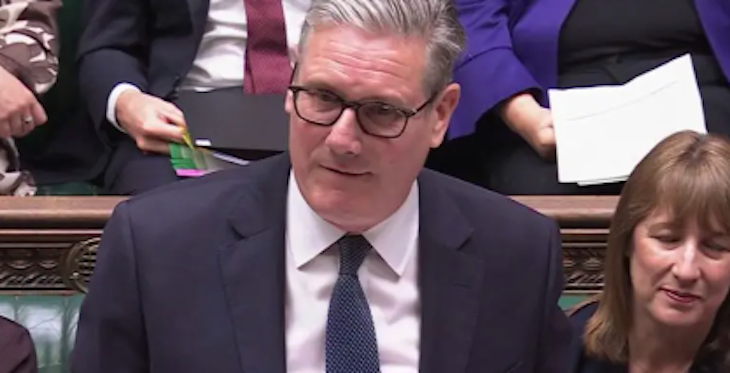
When MPs and peers were recalled to parliament for an emergency debate on renationalising British Steel, one man was the talk of the terrace: Nigel Farage. Out by the river, a Labour peer congratulated the Reform leader for ‘leading on everything’. After all, Farage had been in Scunthorpe days earlier calling for steel nationalisation.
Since I started covering British politics for The Spectator ten years and six prime ministers ago, there have been plenty of times when an insurgent party appeared to be on the rise. In 2015, the ascent of Ukip contributed to David Cameron’s decision to call a referendum on EU membership. Then in 2019, the success of the Brexit party in the European elections spurred many Tories into backing Boris Johnson for leader. On the left, there was Change UK, the breakaway Labour group during the Corbyn years, which at its height polled as the third biggest party in Westminster before it quickly fizzled out. Whatever the success of these parties, none broke through in a general election.
As I write this column for the final time, the direction of British politics for the next ten years depends on whether Reform can finally buck that trend. ‘Ukip was a forerunner for what is actually happening which is despite the first-past-the-post system, the old two-party system is breaking down,’ Farage tells me. ‘The split on the left is huge.’
The local elections next month will be the first chance since Labour’s landslide victory last year to assess how serious the fracturing is. Both Labour and the Tories are braced for a miserable night. Their only hope is that the negative press will be shared equally.
Last month, thousands gathered in Birmingham for the launch of Farage’s local elections campaign. While critics were quick to point out that there were empty seats in the 15,000-capacity arena, the turnout was undoubtedly far greater than at any event by a rival. Shadow ministers joke that the Tories can’t campaign between 1 p.m. and 3 p.m. as that’s when their activists have to take a nap.
The Runcorn and Helsby by-election – also on 1 May – is described by one senior Labour figure as ‘on a knife edge’. Reform insiders say they have been helped by the government. ‘Jess Phillips announcing there will be no grooming gang inquiry is perfect timing for getting our voters out,’ says one.
Reform strategists hope the party will make gains in Lancashire, County Durham, Hull, Doncaster and the East Midlands. ‘I think we’re going to surprise everyone,’ Farage says. ‘I said on 5 July at 3 a.m. in Clacton “We’re coming for Labour now” and very few people took me seriously apart from Tony Blair, who that weekend said Labour need to be cautious about Reform.’
If Labour wasn’t worried then, it is now. No. 10 and the thinktank Labour Together are working on anti-Reform attack lines. The first is the claim that Farage can’t be trusted on the NHS; the next that he is really a Tory and could help the Tories return to power.
Farage says that Reform is ‘biting into the Labour vote in the north in a way you can’t even believe’
The decision to recall parliament to renationalise British Steel was partly born of an urgency to respond to the situation. But it’s also the case that senior figures in Downing Street were happy for a dramatic moment that suggests Labour is on the side of industry and the working classes.
There is a battle shaping up for the north of England. The Tories’ Red Wall victory in 2019 may have been short-lived, but a realignment away from Labour could still take place. ‘What it’s really getting down to are working people,’ says Farage. ‘People who actually go to work, have alarm clocks, are very much now our voters. And that for Labour is a massive problem.’
Farage says that Reform is ‘biting into the Labour vote in the north in a way you can’t even believe’ and there is evidence to back him up. Reform recently won a Tameside council ward in the deep-red constituency of Jonathan Reynolds, the Business Secretary. After stepping in for steel, Keir Starmer faces questions about whether he will do the same for Port Talbot or Grangemouth. It’s no coincidence that these are the places Reform has been building up support.
Some of this support is to do with how the two main parties are losing their bases. The Tories are still working out what they stand for. Kemi Badenoch wants to take her time, but her MPs are running out of patience. ‘Her best interview has been her saying she hasn’t watched a Netflix show,’ complains one Tory MP. In a recent Labour Together focus group in Tamworth and Rother Valley, attendees struggled to identify Badenoch, with some suggesting the name referred to a male politician.
Most in the Tory party think she has at least a year to turn things around, but her shadow justice secretary, Robert Jenrick, is increasingly spoken of as a possible successor. Starmer finds his left flank under attack from pro-Gaza independents, a resurgent Scottish National party and the Greens.
There is plenty of time for this to change before the next general election, but in a few weeks Reform will probably have a much bigger presence in local government. New Reform mayors will enact ‘British Doge’, Farage’s scheme inspired by Elon Musk’s war on spending in the US. ‘The attitude we’re going to take,’ says Farage, ‘is that every council, every mayoralty, needs Doge.’
How can Labour and the Tories respond? One option is to wait for Farage to make a mistake. He’s already had in-fighting issues with Rupert Lowe and there’s talk of tension between senior staff. Some natural supporters worry he has become too moderate for his party’s base. He’s also grown more critical of Donald Trump. ‘Some of the big donors are waiting before putting money in,’ says one Reform insider.

For Labour, there are rumours of a reshuffle after the coming welfare vote, on the grounds that the prospect of career advancement could limit rebel numbers. But Starmer may wish to tread carefully. If he were to move favourites among party members, such as Ed Miliband or Bridget Phillipson, he could create more discontent on the left.
This month, the PM axed several loyal aides in a policy unit clear-out. ‘It shows Starmer will eventually kill anyone seen as a blocker,’ says a former colleague.
It’s hard to say whether Farage’s insurgent party will trip up again or if this time will be different. But how Reform fares next month will shape what Starmer and Badenoch do next. Both Labour and the Tories will agree there is one party defining British politics right now and it’s not them.









Comments